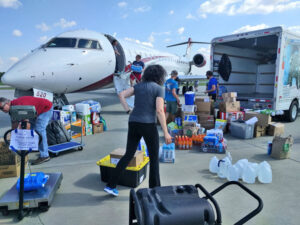
November 30, 2018 – Hurricanes wreaked havoc on the country in 2018 and left many without basic necessities following each devastating storm. Today marks the official last day of hurricane season, and we hope Mother Nature takes note.
Pilots played a critical role in providing aid by flying thousands of pounds worth of supplies to those affected in areas that were difficult to access by other means. Volunteers were mobilized to help load planes, and airports became hubs to collect supplies and organize them for distribution. After hurricane Florence pounded the coast of North and South Carolina in September, 2018, Raleigh-Durham International Airport (RDU) became the staging area for most donations.
Volunteers Shaun Carroll, Graham Rattray, and Chris Brazil are all from eastern North Carolina and were affected by Hurricane Florence. As they took part in the relief efforts with Operation Airdrop, they each became inspired to learn to fly!
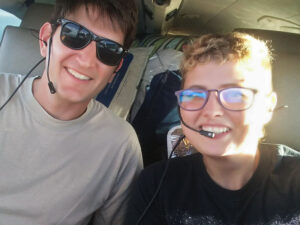
Shaun Carroll, 30, Raleigh, NC
I ended up at Operation Airdrop entirely by accident. It was one of those situations where the stars aligned just right, and suddenly, I was in a command center directing pilots to destinations across the coast. It began because my friends were on the ground as first responders, paddling through the debris to pull survivors out of flooded homes, and I wanted to make sure they had everything they needed to keep going despite the destruction around us.
The first night, my friends needed the supplies that we had here in Raleigh, and I was just coming to help make sure everything was going where it needed to. We loaded up a plane and as we finished up, the pilot asked me if I wanted to come with him. The pilot was an Air Force flight instructor, his uniform perfectly arranged and clean cut, and then myself, a scruffy, overgrown punk of an engineer, both hopped into the plane and taxied for takeoff. I didn’t know what to say other than thank you and stare at amazement as he balanced multiple communication channels in some unknown new language and dialed in on an instrument panel I couldn’t begin to comprehend. Everything he did was with such careful precision, and even knowing nothing about aviation, it was still clear how blessed I was just to witness that kind of mastery.
We met my friends on the coast and dropped off the shipment, and it was the flight back that hooked me. There was a storm ahead and you could see lightning bounce from cloud to cloud in the distance as it became dark. The pilot smiled and told me, despite how long he’s been flying, this had always been his favorite part. It was so breathtakingly beautiful, and somehow, from the strangest of circumstances, I was able to witness it.
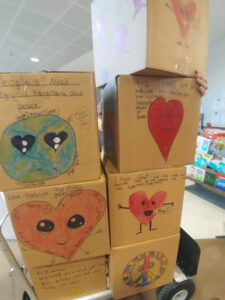
We landed, and from that moment on, I knew I wanted to get back in the skies again. Dan Benedix, one of the Airdrop coordinators and a pilot, asked me immediately how my flight was, and I sat there wide-eyed and amazed, wondering how I could figure out how to fly too. He laughed and said it’s easy, you just learn how to fly, then you’ll fly. It was so straightforward.
I spent the rest of my volunteer time helping coordinate shipments with pilots and destinations with various needs. Any time I had a second, I’d snag Ethan Garrity, one of the directors of Airdrop, or any of the pilots and asked them to explain the different planes, which model had what, and asked as many questions as I could including why they loved flying, how long they had flown, and what they were flying that day. In just a week, I had been completely immersed in general aviation, and despite being physically and emotionally exhausted from our work, I ended up falling in love without realizing it.
Since then, I’ve dreamed of being back up there. As I’m both an engineer and a farmer and recently married, my time and budgeting made it seem like flying was back to being an impossible hurdle, until I discovered the sport license. I just want to be back in the skies, I want to feel my heart skip that single beat during takeoff, I want to see everything so clearly again. So I’ve studied how to get back up there and made learning how to fly my own new horizon. And I couldn’t be any more grateful for the opportunity to be a part of something as beautiful as Airdrop was, and I am forever grateful they showed me a part of me I didn’t even know was missing.
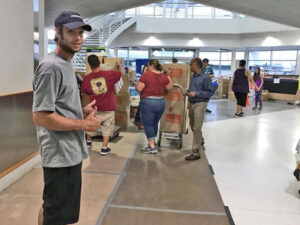
Graham Rattray, 25, Raleigh, NC
We rented a trailer to transport mine and my father’s guitar collection and two motorcycles to the Triangle area while evacuating. After we arrived and realized how bad Florence would be, I contacted a friend to record a song with the intent of using any profits to donate to hurricane relief efforts. I also thought it would be a good idea to collect donations since I had to return the trailer anyway.
Donations poured in until I had three tons of water to transport and more than 2,200 pounds of other food and necessities. We rented a storage unit to hold it all. I was getting questions about how I would distribute the supplies, so I focused my efforts on finding an organization that could help me. Tons of great organizations were suggested that could distribute supplies in the Wilmington area, but I still had to figure out how to transport the supplies. Trucks wouldn’t be the best option due to the large volume and potential dangers and obstacles in the road.
I always assumed so much was involved but I realized you could be a regular person and still become a pilot.
I found out about Operation Airdrop and made a phone call to the Wilmington Airport, which eventually got me in contact with Ethan, the organizer at RDU. I knew this was the best option, and I picked another group in Wilmington to distribute the supplies.
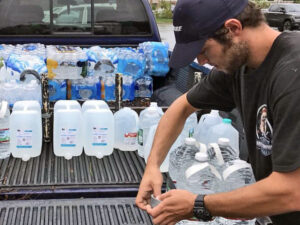
It was interesting to see how tangible it is to have a plane and become a pilot. I always assumed so much was involved, but I realized you could be a regular person and still become a pilot. Also, I was noticing a lot of the different mechanical parts in planes were very similar to the various machinery I have experience with as a mechanic. Figuring out the logistics of how much weight could be held and transported on each aircraft was interesting and similar to the trucking industry I work in. It was exhilarating to be so close to all of the airplanes, and I was even able to get on Joe Gibbs’ personal aircraft.
Every pilot I met was more than willing to help people they didn’t know and use their personal aircraft. I appreciated that they were willing to go out of their way to deliver supplies in a time of need, and many of the same pilots kept coming back for the three days I was there. The fuel was expensive, but they helped regardless. People that hadn’t eaten in days and were finally given food and supplies really made an impact on me.
Weeks after volunteering, I got back in contact with another volunteer I met, Dan Benedix, and mentioned that I was interested in becoming an airplane mechanic. He said if I became a pilot I would also understand aviation mechanics better. I hadn’t previously realized how tangible it was to become a pilot. Having a strong mechanical background and an interest in fixing machines and equipment, I will pursue other relief efforts to contribute to in the future if I become a pilot or aviation mechanic.
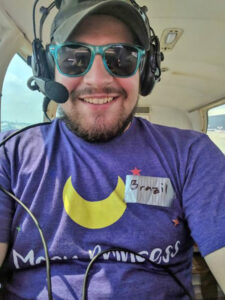
Chris Brazil, 24, Durham, NC
My parents live on the coast of North Carolina in Oak Island, where I grew up. A few years ago, I moved to Durham and got involved with a few different groups dedicated to helping members of our communities through tough times. When Florence hit the coast, a friend of mine posted about providing hurricane relief, so after I checked on my parents and close friends from the area, I signed up.
We started doing several runs around Raleigh, Durham, and Chapel Hill, NC, loading trucks and dropping off care packages for local community organizations to distribute. A few days after Florence hit, I attended a meeting and heard about Operation Airdrop. As soon as I got home, I called my new contact for the organization, Ethan Garrity. I couldn’t have picked better timing because Ethan had just landed at the Raleigh airport and was picking up supplies. I told him my parents lived 10 minutes from an airport, and they could help distribute supplies in their county.
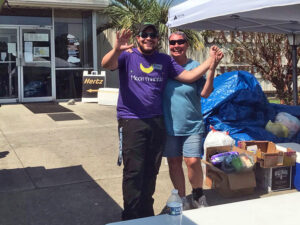
After making some phone calls and learning that one of my closest friends was already helping with Operation Airdrop, plans were underway to send help to Oak Island. I called my Mom and said, “Ma, help’s on the way. I’m sending you planes. Get a team on standby, and I’ll let you know when the first one is wheels up.” I don’t think she believed me. When I called her again, maybe two hours later, I could tell her gorgeous smile was lighting up the room with excitement.
I let my parents take over for the relief efforts in their town, and I started working on drops for Wilmington, Jacksonville, and Cape Fear. We had 25 drops all over North Carolina and sent 28,000 pounds of supplies by the end of the day. I was surrounded by so many people from all walks of life, it made me realize how strong people are and what we can truly do for each other.
Pilots were flooding into TacAir (the FBO at Raleigh) saying, “I’ve got a plane. Give me a manifest and a destination.” One volunteer pilot, Bob and his co-pilot Rich, let me join them on a flight to my hometown to see my parents. My mom was so surprised to see me she started crying and hugged me.
Throughout my time helping, I began to learn the lingo of aviation and felt more comfortable with the phonetic alphabet and what Zulu time meant. I realized I loved it! Since then, I’ve been listening to aviation podcasts and bought the X-Plane Flight Simulator. I started researching where I could get a quality flight education at an affordable price. I’ve flown twice since my time with Operation Airdrop – once in a Cessna 152 with a friend and again in an RV-12, though admittedly, I didn’t do much of the flying in that as it seemed more advanced.
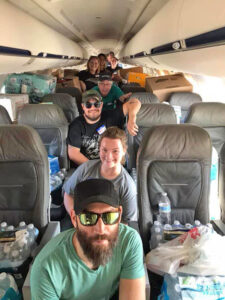
My first two flights were over my beautiful hometown of Oak Island. I’ll never grow bored of seeing the place I grew up from a few thousand feet up in the air. Flying is liberating, exhilarating, and fun. I love aviation, and if I can continue on this path, I know I will be able to do more good in the future. That’s the business I’m into.
Special thanks to Dan Benedix for his help coordinating relief efforts at RDU for Operation Airdrop and connecting us with Shaun, Graham, and Chris. We hope to share updates about their pilot journeys in the near future.
If you are interested in learning to fly, call an Aviation Training Consultant at 800.874.5346, ext. 471.
Written by Callie Wilkes, Gleim Aviation Marketing & STEM Coordinator
About Gleim Aviation
Since 1980, Gleim Aviation’s team of pilots, instructors, writers, designers, and programmers has helped aviators pass millions of FAA knowledge and practical tests using the unique Gleim Knowledge Transfer System. Gleim is an environmentally-friendly company headquartered in Gainesville, FL.

